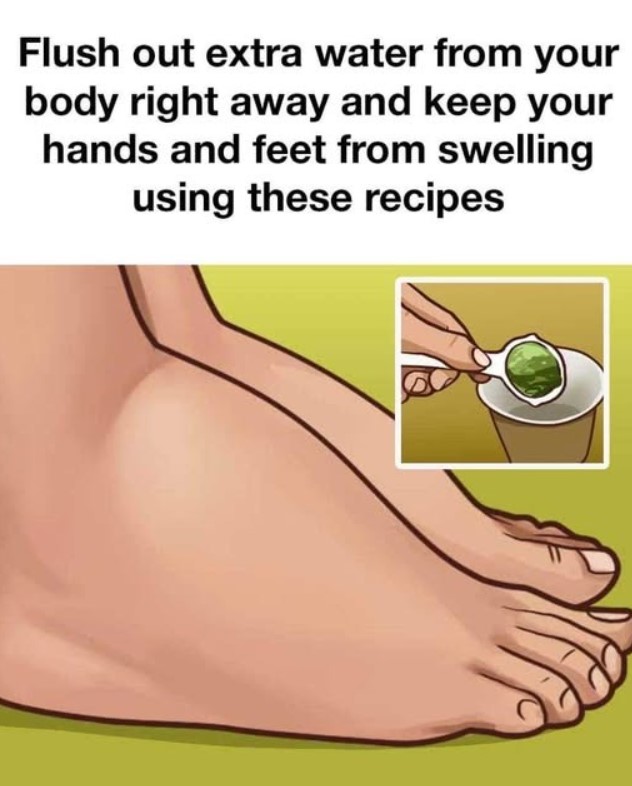Water retention, also known as edema, is a condition where excess fluids build up in the body, leading to swelling, particularly in the legs, feet, hands, and face. This common issue can be caused by various factors, ranging from lifestyle choices to underlying health conditions. While the condition often resolves on its own, persistent or severe water retention can be uncomfortable and may require attention.
In this article, we will explore some practical and natural methods for managing water retention, including dietary changes, hydration, and lifestyle adjustments. By following these simple yet effective strategies, you can reduce swelling and improve overall health.
Understanding Water Retention
Water retention occurs when the body holds onto more fluid than it needs. This can happen for a variety of reasons. A high-sodium diet, hormonal imbalances, lack of physical activity, and certain medications can all contribute to this condition. Other underlying health issues, such as kidney disease or heart problems, can also cause fluid buildup. Understanding the root cause is essential for managing and preventing water retention effectively.
One of the most common signs of water retention is swelling in the extremities. If you notice that your hands, feet, or ankles are puffy or feel tight, this could be a sign of edema. In severe cases, the skin over the swollen area may appear shiny or stretched. Sometimes, an indentation may form in the swollen area after applying pressure. Identifying these symptoms early on is crucial for taking steps to minimize the condition and prevent further complications.
The Importance of Hydration
It may seem counterintuitive, but staying hydrated is one of the most effective ways to combat water retention. When the body is dehydrated, it begins to hold on to more water in an attempt to compensate for the lack of fluid. On the other hand, drinking enough water helps the kidneys flush out excess sodium and toxins, preventing the buildup of fluids. Aim to drink at least eight glasses of water a day to maintain proper hydration levels.
Dietary Changes for Managing Water Retention
Your diet plays a significant role in regulating fluid balance in the body. Making some simple dietary changes can help reduce water retention. Here are some suggestions:
- Reduce Salt Intake: Consuming too much sodium is one of the main causes of fluid retention. Processed and packaged foods are often loaded with salt, so try to limit your intake of these foods. Instead, opt for fresh fruits, vegetables, and lean proteins, which are naturally low in sodium.
- Increase Potassium-Rich Foods: Potassium helps balance sodium levels in the body and can reduce water retention. Foods rich in potassium include bananas, avocados, sweet potatoes, spinach, and tomatoes. Incorporating these foods into your diet can help regulate fluid levels and prevent swelling.
- Focus on Whole Foods: A diet high in whole, unprocessed foods is not only beneficial for overall health but also for reducing fluid retention. Include plenty of fruits, vegetables, lean meats, and healthy fats in your meals. These nutrient-dense foods support your body’s natural detoxification processes, helping to expel excess water.
Natural Diuretics to Help Flush Out Excess Water
Certain foods have natural diuretic properties, which can help the body expel excess fluid. Incorporating these foods into your diet can support hydration while aiding in the reduction of water retention. Some examples of natural diuretics include:
- Cucumbers: High in water content, cucumbers help hydrate the body and flush out excess sodium.
- Watermelon: This hydrating fruit is packed with antioxidants and can act as a mild diuretic.
- Celery: Celery contains compounds that help the kidneys filter excess water and toxins.
- Citrus Fruits: Oranges, lemons, and grapefruits have diuretic properties and can promote fluid balance.
Herbal Teas for Reducing Swelling
Herbal teas are another natural remedy that can help reduce water retention. Certain herbs, such as dandelion, parsley, and green tea, have mild diuretic effects, helping to flush out excess water from the body. Drinking one or two cups of herbal tea daily can provide relief from swelling and help with digestion.
- Dandelion Tea: Known for its diuretic properties, dandelion tea can help the body eliminate excess water. It’s also a great option for improving liver function and detoxifying the body.
- Parsley Tea: Parsley is another herb that supports kidney function and promotes fluid balance.
- Green Tea: Packed with antioxidants, green tea helps reduce inflammation and aids in detoxifying the body.
Epsom Salt Baths for Swelling Relief
Soaking in an Epsom salt bath is an excellent way to alleviate swelling and reduce water retention. Epsom salts, which contain magnesium sulfate, have been shown to reduce inflammation and improve circulation. To create a soothing bath, simply add half a cup of Epsom salt to warm water and soak your hands, feet, or entire body for 15–20 minutes. This practice can be done several times a week to relieve discomfort and promote relaxation.
Anti-Inflammatory Smoothie Recipe for Water Retention
Smoothies are a great way to hydrate while incorporating ingredients that support the body’s natural detoxification processes. Here’s a simple anti-inflammatory smoothie recipe to help reduce water retention and boost your nutrient intake:
Ingredients:
- 1/2 cucumber (minced)
- 1 tablespoon chia seeds
- 1 cup coconut water
- 1 cup chopped pineapple
- 1 cup kale
- Juice of 1/2 lemon
Instructions:
- Add all ingredients to a blender.
- Blend until smooth and creamy.
- Enjoy this hydrating and anti-inflammatory smoothie in the morning to kick-start your day and reduce swelling.
This smoothie is packed with water-rich ingredients, potassium, and antioxidants, making it an excellent choice for combating water retention.
DIY Natural Diuretic Drink
If you’re looking for a quick, natural diuretic to help flush out excess fluids, try this simple recipe:
Ingredients:
- 1/2 cucumber (diced)
- 1/2 cup cranberry juice
- 1 cup watermelon (diced)
- Juice of 1 lemon
Instructions:
- Combine all ingredients in a blender.
- Blend until smooth.
- Drink this refreshing beverage in the morning or late afternoon for optimal results.
This natural diuretic drink is not only hydrating but also packed with antioxidants that support kidney health and fluid regulation.
Detoxifying and Hydrating Soup Recipe
Soup can be a great way to nourish the body while helping to reduce water retention. This detoxifying and hydrating soup is rich in nutrients and can help flush out excess water from the body.
Ingredients:
- 3 cloves garlic (minced)
- 1 onion (chopped)
- 1 tablespoon olive oil
- 4 cups low-sodium vegetable broth
- 1 cup chopped carrots
- 1 cup chopped celery
- 2 cups spinach
- 1 tablespoon fresh parsley
- Salt and pepper to taste
Instructions:
- In a large pot, sauté garlic and onion in olive oil until softened.
- Add vegetable broth, carrots, celery, spinach, and parsley. Bring to a simmer.
- Cook for 20–25 minutes until the vegetables are tender.
- Season with salt and pepper to taste.
- Enjoy this warm, detoxifying soup to help hydrate and reduce water retention.
Lifestyle Changes to Combat Water Retention
In addition to dietary adjustments, making some changes to your everyday habits can help prevent water retention:
- Exercise Regularly: Physical activity promotes better circulation and helps reduce fluid buildup in the extremities.
- Elevate Your Legs: Elevating your legs for short periods throughout the day can help improve circulation and reduce swelling.
- Compression Stockings: Wearing compression stockings can help support circulation and reduce swelling in the legs and feet.
- Avoid Prolonged Sitting or Standing: If you have a sedentary job, make sure to take breaks and move around regularly to encourage blood flow.
Conclusion :
Water retention is a common issue that can cause discomfort, but with the right dietary choices, natural remedies, and lifestyle changes, it can be managed effectively. By staying hydrated, reducing salt intake, and incorporating potassium-rich foods and natural diuretics into your diet, you can help prevent and alleviate swelling. Additionally, herbal teas, Epsom salt baths, and nutrient-dense smoothies can provide extra support for reducing water retention. Adopting these simple yet powerful strategies can help you feel more comfortable and improve your overall health.










